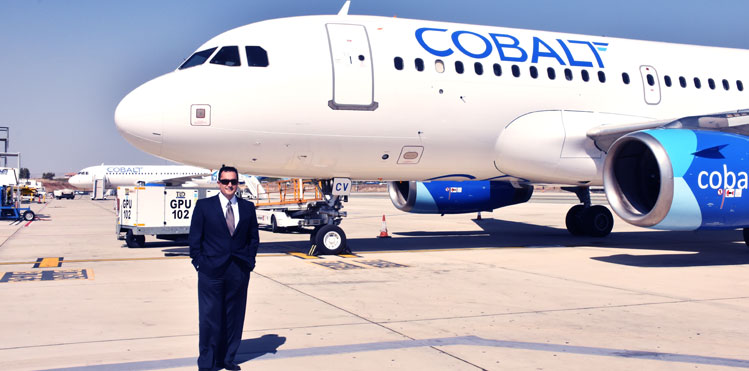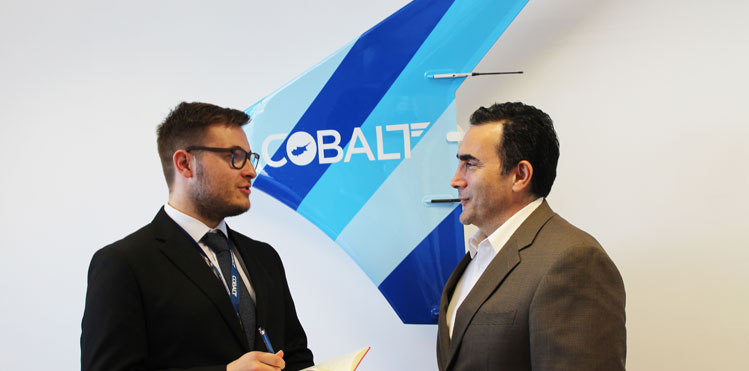
Andrew Madar, CEO Cobalt: “There is no way we are going to do long-haul and not have a connection to China. Right now we are eagerly followed and encouraged by the Chinese Government, particularly with Cyprus being part of the ‘One Belt, One Road’ initiative.”
Andrew Madar, CEO Cobalt, interviewed by Jonathan Ford.
Having taken flight for the first time on 7 July 2016, Cobalt has grown to have six aircraft in its fleet and serves 16 destinations across Europe, ranging from London Stansted and Paris CDG to Heraklion and Thessaloniki. Now the carrier, which is entering its second year of operation, is established from Larnaca and is gearing up for its next step – long-haul.
It has been no easy feat for the start-up carrier, with it having some issues during its initial operations, but Cobalt has survived its first year and is now backed by a sound investment and a clear strategic plan. Andrew Madar joined Cobalt as CEO in August 2016, with his aviation career beginning in engineering. “I wanted to be a pilot originally, but I could not afford it, so I became an engineer,” he comments.
Since gaining three degrees in aerospace engineering and business administration, Madar has worked for companies including Boeing and GE, where he worked for over 20 years, as well as Comac in China.
Changing from LCC to hybrid
Originally set-up to be a low-cost carrier (LCC), the structure of Cobalt’s strategy and concept has now changed to a more hybrid model. “We are never going to be able to compete with the likes of Ryanair head-to-head with a pure LCC concept, and I don’t think we have that type of market either,” says Madar.
The airline now allows passengers to book economy comfort seats on some flights due to the fleet currently having mixed configurations, but soon a premium economy product will be offered on all aircraft. “We are going to turn the comfort seats into premium economy shortly with some additions,” Madar explains. “The price ratio for these seats will be slightly higher than the price of an economy seat. Eventually when everything is in place we will be offering a business seat. We may call it ‘Business Light’. It will be business class with a bunch of goodies attached to it, and that will be offered at a market-driven price.”
The airline has also started carrying cargo from Cyprus and is hoping to have interlining agreements with other carriers in the future on some of its routes, including on its future long-haul services.
While the airline has changed its original concept from being a pure LCC to a hybrid carrier, it does not have plans to grow at a fast pace. “Cobalt is not going to become a big carrier right away,” Madar adds. “It keeps us under the radar, so we do not make too much of a wave in anybody else’s game plan. We can have a nice, steady, safe growth and operation that will allow us to focus on our next phases. Cyprus’ size, population and market in winter does not justify a bigger fleet for an airline based here, so that’s why we are not going to go into a rapid growth phase.”
Cobalt factbox
- Base: Larnaca
- Destinations: 16 (as of June 2017)
- Fleet: 6 aircraft
4 A320s and 2 A319s
Future fleet: A330-200s - 2016 passengers: 100,000+
- Staff members: 252
Next stop long-haul
Cobalt already has a presence in the Middle East, with the airline serving Tel Aviv and Beirut. It has big plans for the region, with future destinations mentioned by Madar including Tehran, Kuwait and Dubai. However, the biggest step in the airline’s future route development is the establishment of long-haul operations, with the first destination to be in China, with plans for these operations to begin at some point in 2018. “We are committed,” Madar asserts. “There is no way we are going to do long-haul and not have a connection to China. Right now we are eagerly followed and encouraged by the Chinese Government, particularly with Cyprus being part of the ‘One Belt, One Road’ initiative. They like what we are doing here. We have some investment from China, which has basically put a spotlight on our airline.”

Andrew Madar, CEO Cobalt, explains to Airport Business’ Jonathan Ford that the airline has changed its original concept from being a pure LCC to a hybrid carrier.
Emphasising the airline’s planned network to China, Madar adds: “With a direct flight to China, we won’t go crazy, and we will not have a massive schedule with daily frequency. We will start off with around two or three weekly flights.”
Although it has not been confirmed by the airline where it will initially fly to in China, Beijing, Shanghai and Guangzhou are highlighted as strong contenders by Madar, but secondary cities including Chengdu and Chongqing should not be ruled out either.
Other destinations that are part of the airline’s long-haul plans are India, South Africa and the US. Cobalt is currently pursuing options for two wide-body aircraft to join its fleet in order to carry out its long-haul operations, with the aircraft of choice being the A330-200.
Connections will help drive traffic
Although the next focus of the carrier’s strategy is on long-haul that does not mean growth in Europe is obsolete. “Connections at the moment are short-haul to short-haul, such as Beirut to Paris and Madrid,” says Madar. “Larnaca is a good place for a connection hub, but we have some work to do with the airport. We have a good relationship with Hermes, and that is not the issue, we just have to figure out the logistics and do some test runs, and that is why we are offering connections at the moment on some of our routes.”
Future destinations for the carrier in Europe are highly likely to be in Germany, the Netherlands, Scandinavia and Russia, with St Petersburg and Moscow key markets that the carrier hopes to be serving before the end of 2017.
Paphos not to be neglected
Also on the agenda for the airline is the establishment of a base in Paphos. When asked by Airport Business about the basing of an aircraft in Paphos, Madar states: “Yes, Paphos will have an aircraft there. We want to take the national carrier flag title and to do that we need to help Cyprus as much as possible. Flying just from Larnaca does not give us that title.”
Currently, Cobalt only flies to Paphos from Athens on a w-pattern rotation from Larnaca, a route which it started in May after Ryanair pulled services. With other services planned to come online from Paphos later this year, routes that are most likely to be launched include destinations in the UK, Germany and Greece.







